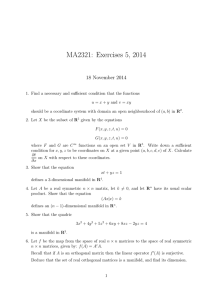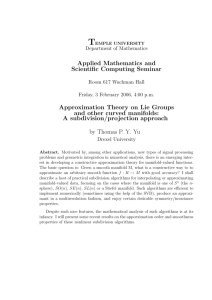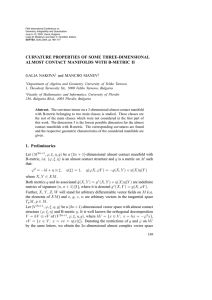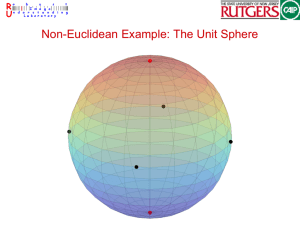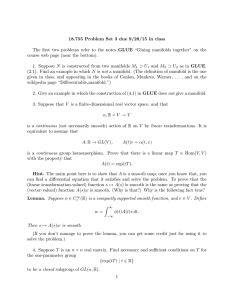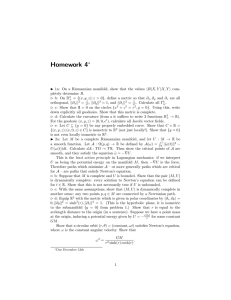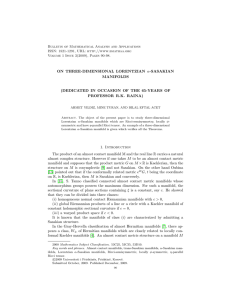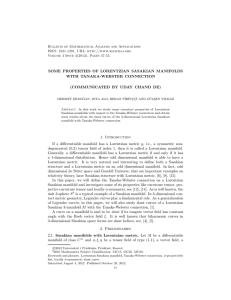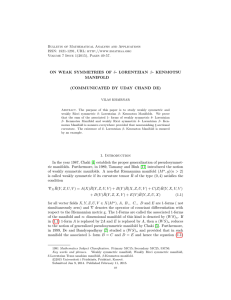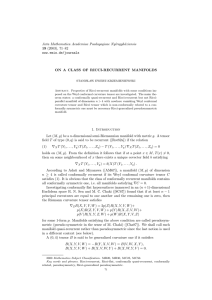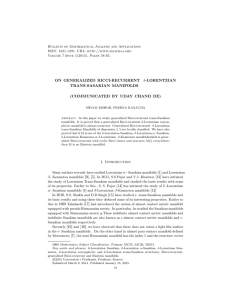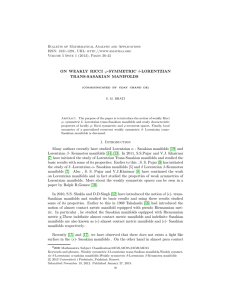Steps in Differential Geometry, Proceedings of the Colloquium
advertisement
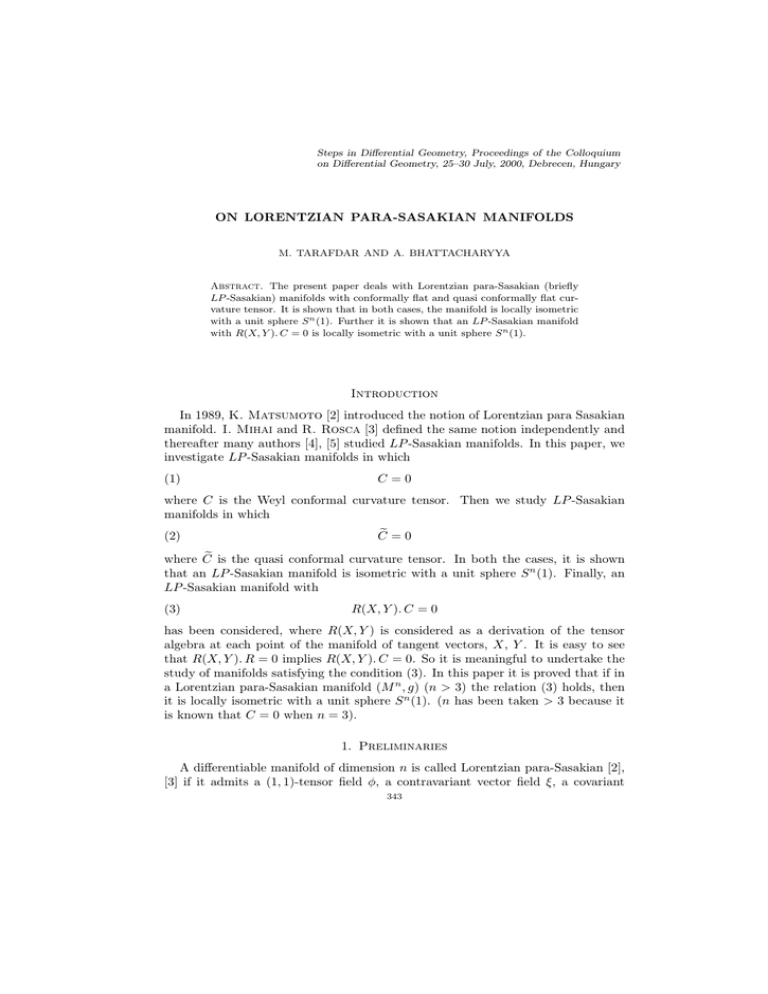
Steps in Differential Geometry, Proceedings of the Colloquium
on Differential Geometry, 25–30 July, 2000, Debrecen, Hungary
ON LORENTZIAN PARA-SASAKIAN MANIFOLDS
M. TARAFDAR AND A. BHATTACHARYYA
Abstract. The present paper deals with Lorentzian para-Sasakian (briefly
LP -Sasakian) manifolds with conformally flat and quasi conformally flat curvature tensor. It is shown that in both cases, the manifold is locally isometric
with a unit sphere S n (1). Further it is shown that an LP -Sasakian manifold
with R(X, Y ). C = 0 is locally isometric with a unit sphere S n (1).
Introduction
In 1989, K. Matsumoto [2] introduced the notion of Lorentzian para Sasakian
manifold. I. Mihai and R. Rosca [3] defined the same notion independently and
thereafter many authors [4], [5] studied LP -Sasakian manifolds. In this paper, we
investigate LP -Sasakian manifolds in which
(1)
C=0
where C is the Weyl conformal curvature tensor. Then we study LP -Sasakian
manifolds in which
(2)
e=0
C
e is the quasi conformal curvature tensor. In both the cases, it is shown
where C
that an LP -Sasakian manifold is isometric with a unit sphere S n (1). Finally, an
LP -Sasakian manifold with
(3)
R(X, Y ). C = 0
has been considered, where R(X, Y ) is considered as a derivation of the tensor
algebra at each point of the manifold of tangent vectors, X, Y . It is easy to see
that R(X, Y ). R = 0 implies R(X, Y ). C = 0. So it is meaningful to undertake the
study of manifolds satisfying the condition (3). In this paper it is proved that if in
a Lorentzian para-Sasakian manifold (M n , g) (n > 3) the relation (3) holds, then
it is locally isometric with a unit sphere S n (1). (n has been taken > 3 because it
is known that C = 0 when n = 3).
1. Preliminaries
A differentiable manifold of dimension n is called Lorentzian para-Sasakian [2],
[3] if it admits a (1, 1)-tensor field φ, a contravariant vector field ξ, a covariant
343
344
M. TARAFDAR AND A. BHATTACHARYYA
vector field η and a Lorentzian metric g which satisfy
(4)
(5)
(6)
(7)
(8)
η(ξ) = −1
φ2 = I + η(X)ξ
g(φX, φY ) = g(X, Y ) + η(X)η(Y )
g(X, ξ) = η(X),
∇X ξ = φX
(∇X φ)Y = [g(X, Y ) + η(X)η(Y )]ξ + [X + η(X)ξ]η(Y )
where ∇ denotes the operator of covariant differentiation with respect to the
Lorentzian metric g.
It can easily be seen that in an LP -Sasakian manifold the following relations
hold:
(9)
(10)
φξ = 0
η(φX) = 0
rank φ = n − 1.
Also, an LP -Sasakian manifold M is said to be η-Einstein if its Ricci tensor S
is of the form
(11)
S(X, Y ) = ag(X, Y ) + bη(X)η(Y )
for any vector fields X, Y where a, b are functions on M .
Further, on such an LP -Sasakian manifold with (φ, η, ξ, g) structure, the following relations hold [4], [5]:
(12)
(13)
(14)
(15)
(16)
(17)
g(R(X, Y )Z, ξ)
R(ξ, X)Y
R(ξ, X)ξ
R(X, Y )ξ
S(X, ξ)
S(φX, φY )
=
=
=
=
=
=
η(R(X, Y )Z) = g(Y, Z)η(X) − g(X, Z)η(Z)
g(X, Y )ξ − η(Y )X
X + η(X)ξ
η(Y )X − η(X)Y
(n − 1)η(X)
S(X, Y ) + (n − 1)η(X)η(Y )
for any vector fields X, Y Z where R(X, Y )Z is the Riemannian curvature tensor.
The above results will be used in the next sections.
2. LP -Sasakian manifolds with C = 0
The conformal curvature tensor C is defined as
1
C(X, Y )Z = R(X, Y )Z −
{g(Y, Z)QX − g(X, Z)QY
n−2
r
(18)
+S(Y, Z)X − S(X, Z)Y } +
{g(Y, Z)X − g(X, Z)Y },
(n − 1)(n − 2)
where
S(X, Y ) = g(QX, Y ).
ON LORENTZIAN PARA-SASAKIAN MANIFOLDS
345
Using (1) we get from (18)
1
(19) R(X, Y )Z =
{g(Y, Z)QX − g(X, Z)QY + S(Y, Z)X
n−2
r
−S(X, Z)Y } −
{g(Y, Z)X − g(X, Z)Y }.
(n − 1)(n − 2)
Taking Z = ξ in (18) and using (7), (15) and (16), we find
n−1
1
η(Y )X − η(X)Y =
{η(Y )QX − η(X)QY } +
{η(Y )X − η(X)Y }
n−2
n−2
r
−
{η(Y )X − η(X)Y }.
(n − 1)(n − 2)
Taking Y = ξ and using (4) we get
r
1
−1 X +
− 1 η(X)ξ.
(20)
QX =
n−1
n−1
Thus the manifold is η-Einstein.
Contracting (20) we get
r = n(n − 1).
(21)
Using (21) in (20) we find
(22)
QX = (n − 1)X.
Putting (22) in (19) we get after a few steps
(23)
R(X, Y )Z = g(Y, Z)X − g(X, Y )Y.
Thus a conformally flat LP -Sasakian manifold is of constant curvature. The
value of this constant is +1. Hence we can state
Theorem 1. A conformally flat LP -Sasakian manifold is locally isometric to a
unit sphere S n (1).
e=0
3. LP -Sasakian manifolds with C
e is defined as
The quasi conformal curvature tensor C
= aR(X, Y )Z + b{S(Y, Z)X − S(X, Z)Y + g(Y, Z)QX
r
a
−g(X, Z)QY } −
+ 2b {g(Y, Z)X − g(X, Z)Y }
n n−1
where a, b are constants such that ab 6= 0 and
(24)C(X, Y )Z
S(Y, Z) = g(QY, Z).
Using (2), we find from (24)
b
(25)R(X, Y )Z = − {S(Y, Z)X − S(X, Z)Y + g(Y, Z)QX
a
r
a
−g(X, Z)QY } +
+ 2b {g(Y, Z)X − g(X, Z)Y }.
n n−1
346
M. TARAFDAR AND A. BHATTACHARYYA
Taking Z = ξ in (18) and using (7), (15) and (16), we get
(26)η(Y )X − η(X)Y
b
= − {η(Y )QX − η(X)QY }
a r
a
b
+ 2b − (n − 1) {η(Y )X − η(X)Y }.
an n − 1
a
Taking Y = ξ and applying (4) we have
r
a
a
(27)
QX =
+ 2b − (n − 1) −
X
bn n − 1
b
a
a
r
+ 2b − − 2(n − 1) η(X)ξ.
+
bn n − 1
b
Contracting (27), we get after a few steps
r = n(n − 1).
(28)
Using (28) in (27), we get
QX = (n − 1)X.
(29)
Finally, using (29), we find from (25)
R(X, Y )Z = g(Y, Z)X − g(X, Z)Y.
Thus we can state
Theorem 2. A quasi conformally flat LP -Sasakian manifold is locally isometric
with a unit sphere S n (1).
4. LP -Sasakian manifolds satisfying R(X, Y ).C=0
Using (7), (13) and (16) we find from (18)
"
1
r
(30)
η(C(X, Y )Z) =
− 1 {g(Y, Z)η(X)
n−2
n−1
#
−g(X, Z)η(Y )} − {S(Y, Z)η(X) − S(X, Z)η(Y )} .
Putting Z = ξ in (30) and using (7), (16) we get
(31)
η(C(X, Y )ξ) = 0.
Again, taking X = ξ in (30), we get
"
1
(32)
η(C(ξ, Y )Z) =
{S(Y, Z) + (n − 1)η(Y )η(Z)}
n−2
#
r
−
− 1 {g(Y, Z) + η(Y )η(Z)} .
n−1
ON LORENTZIAN PARA-SASAKIAN MANIFOLDS
347
Now
(33) (R(X, Y )C)(U, V )W
= R(X, Y )C(U, V )W − C(R(X, Y )U, V )W
−C(U, R)(X, Y )V )W − C(U, V )R(X, Y )W.
Using (3), we find from above
g[R(ξ, Y )C(U, V )W, ξ] − g[C(R(ξ, Y )U, V )W, ξ]
−g[C(U, R(ξ, Y )V )W, ξ] − g[C(U, V )R(ξ, Y )W, ξ] = 0.
Using (7) and (13) we get
(34)
−‘C(U, V, W, Y ) − η(Y )η(C(U, V )W ) − G(Y, U )η(C(ξ, V )W )
+η(U )η(C(Y, V )W ) − g(Y, V )η(C(U, ξ)W ) + η(V )η(C(U, Y )W )
−g(Y, W )η(C(U, V )ξ) + η(W )η(C(U, V )Y ) = 0,
where
‘C(U, V, W, Y ) = g(C(U, V )W, Y ).
Putting U = Y in (34) we find
(35)
−‘C(U, V, W, U ) − η(U )η(C(U, V )W ) + η(U )η(C(U, V )W )
+η(V )η(C(U, U )W ) + η(W )η(C(U, V )U ) − g(U, U )η(C(ξ, V )W )
−g(U, V )η(C(U, ξ)W ) − g(U, W )η(C(U, V )ξ) = 0.
Let {ei : i = 1, . . . , n} be an orthonormal basis of the tangent space at any point,
then the sum for 1 ≤ i ≤ n of the relations (35) for U = ei gives
(1 − n)η(C(ξ, V )W ) = 0
(36)
η(C(ξ, V )W ) = 0
as n > 3.
Using (31) and (36), (34) takes the form
(37)
−‘C(U, V, W, Y ) − η(Y )η(C(U, V )W ) + η(U )η(C(Y, V )W )
+η(V )η(C(U, Y )W ) + η(W )η(C(U, V )Y ) = 0.
Using (30) in (37) we get
(38)
1
−‘C(U, V, W, Y ) + η(W )
n−2
"
r
− 1 {η(U )g(V, Y )
n−1
#
−η(V )g(U, Y )} − {η(U )S(V, Y ) − η(V )S(U, Y )} = 0.
In virtue of (36), (32) reduces to
r
r
(39)
S(Y, Z) =
1 g(Y, Z) +
− n η(Y )η(Z).
n−1
n−1
Using (39), (37) reduces to
(40)
−‘C(U, V, W, Y ) = 0,
348
M. TARAFDAR AND A. BHATTACHARYYA
i.e.
(41)
C(U, V )W = 0.
Hence the manifold is conformally flat. Using Theorem 1, we state
Theorem 3. If in an LP -Sasakian manifold M n (n > 3) the relation R(X, Y ). C = 0
holds, then it is locally isometric with a unit sphere S n (1).
For a conformally symmetric Riemannian manifold [1], we have ∇C = 0. Hence
for such a manifold R(X, Y ). C = 0 holds. Thus we have the following corollary of
the above theorem:
Corollary 1. A conformally symmetric LP -Sasakian manifold M n (n > 3) is
locally isometric with a unit sphere S n (1).
References
[1] Chaki, M.C. and Gupta, B., On Conformally Symmetric Spaces, Indian J. Math., 5, 1963,
113–122.
[2] Matsumoto, K., On Lorentzian paracontact manifolds, Bull. Of Yamagata Univ. Nat. Sci.,
Vol. 12, No. 2, 1989, pp. 151–156.
[3] Mihai, I. and Rosca, R., On Lorentzian P -Sasakian manifolds, Classical Analysis, World
Scientific Publi., Singapore, 1992, pp. 155–169.
[4] Matsumoto, K. and Mihai, I., On a certain transformation in a Lorentzian para-Sasakian
manifold, Tensor, N.S., Vol. 47, 1988, pp. 189–197.
[5] Mihai, I. A.A. Shaikh and Uday Chand De, On Lorentzian para-Sasakian Manifolds.
M. Tarafdar and A. Bhattachharyya, Department of Pure Mathematics, University
of Calcutta, 35, Ballygunge Circular Road, Calcutta: 700019, India
E-mail address: manjusha@cubmb.ernet.in
